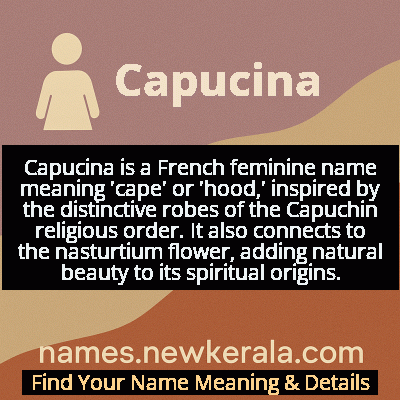Capucina Name Meaning & Details
Origin, Popularity, Numerology Analysis & Name Meaning of Capucina
Discover the origin, meaning, and cultural significance of the name CAPUCINA. Delve into its historical roots and explore the lasting impact it has had on communities and traditions.
Name
Capucina
Gender
Female
Origin
French
Lucky Number
5
Meaning of the Name - Capucina
Capucina is a French feminine name meaning 'cape' or 'hood,' inspired by the distinctive robes of the Capuchin religious order. It also connects to the nasturtium flower, adding natural beauty to its spiritual origins.
Capucina - Complete Numerology Analysis
Your Numerology Number
Based on Pythagorean Numerology System
Ruling Planet
Mercury
Positive Nature
Adventurous, dynamic, curious, and social.
Negative Traits
Restless, impatient, inconsistent, prone to indulgence.
Lucky Colours
Green, white.
Lucky Days
Wednesday.
Lucky Stones
Emerald.
Harmony Numbers
1, 3, 9.
Best Suited Professions
Sales, marketing, travel, entertainment.
What People Like About You
Versatility, charisma, adventurous spirit.
Famous People Named Capucina
Capucine
Actress
French actress and model who appeared in numerous European and American films during the 1960s
Sœur Capucine
Religious Figure
French nun known for charitable works and establishing schools for underprivileged children
Marie-Capucine
Artist
French painter known for her vibrant floral compositions and contributions to modern impressionism
Name Variations & International Equivalents
Click on blue names to explore their detailed meanings. Gray names with will be available soon.
Cultural & Historical Significance
The name also connects to the nasturtium flower (capucine in French), which symbolizes patriotism and conquest in the language of flowers, creating a beautiful duality between religious devotion and natural beauty in French naming traditions. This botanical association added a layer of romanticism to the name during the 19th century, when flower names became fashionable. The name's evolution reflects France's complex relationship between religious tradition and secular beauty, making it a fascinating study in cultural naming practices.
Extended Personality Analysis
Individuals named Capucina are often perceived as graceful, thoughtful, and spiritually inclined, carrying an air of quiet dignity and refined simplicity. They tend to be intuitive and empathetic, with a natural ability to understand others' emotions while maintaining a sense of mystery and reserve. These personalities often exhibit strong artistic sensibilities and appreciation for beauty in everyday life, combined with practical wisdom and organizational skills.
Their calm demeanor masks a determined spirit and strong convictions, making them both gentle companions and reliable pillars in times of need. The name suggests someone who balances tradition with individuality, often serving as a calming influence in their social circles while pursuing their passions with quiet determination. This combination of outward serenity and inner strength makes Capucinas particularly effective in roles requiring diplomacy, creativity, and emotional intelligence. They typically value deep, meaningful relationships over superficial connections and often become the emotional anchors in their families and communities.
Modern Usage & Popularity
In contemporary times, Capucina remains a rare but cherished name in France and French-speaking regions, experiencing a modest revival among parents seeking traditional yet distinctive names. While not appearing in popular name charts, it maintains a presence in artistic and intellectual circles, often chosen by families with Catholic heritage or appreciation for botanical names. The name's usage has expanded slightly beyond France to other European countries, particularly among francophile communities. Modern parents are drawn to its elegant sound, historical depth, and connection to nature through the nasturtium flower association. The simplified spelling 'Capucine' is more commonly used today, though both forms convey the same graceful, old-world charm that appeals to contemporary naming sensibilities seeking both uniqueness and tradition.
Symbolic & Spiritual Meanings
Symbolically, Capucina represents protection and spiritual shelter, drawing from the hooded cloak of its religious origins that signifies both physical covering and emotional refuge. The name embodies the concept of humility veiling inner strength, much like the Capuchin monks who combined simple appearances with profound spiritual dedication. In floral symbolism, its connection to the nasturtium flower adds layers of meaning including patriotism, victory in struggle, and maternal love. The climbing nature of the nasturtium plant symbolizes ambition and reaching for higher ideals, while its edible qualities represent nourishment and practicality. Together, these symbols create a rich tapestry of meaning around protection, growth, beauty, and spiritual depth that has made the name endure through centuries of cultural change.

